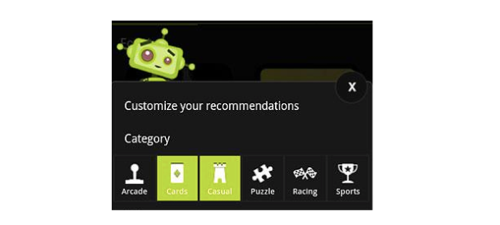
Social discovery is the latest buzzword on the Web, but it has limits. Here’s how one company is trying to use (but not over-use) social discovery to figure out what game you want to play before you even know you want to play it.
(This is Part 1 in a series of articles about social discovery. You can read Part 2 here.)
There are zillions of Flash games online, and finding the one you want to play at the time you want to play it can take far too long. Particularly if you’re looking for something to kill a few stray minutes while you’re commuting or waiting for a friend who’s running late for a dinner reservation.
That’s where Hooked Media Group steps in. The San Francisco-based app developer takes advantage of users’ social connections to predict what games they’ll enjoy. This approach to recommendation is a form of social discovery, a phrase that describes peoples’ tendency to follow recommendations from friends rather than vested interests like vendors or publishers, or even disinterested parties like search engines. “The number of apps keeps growing,” said Prita Uppal, Hooked Media’s CEO. “We’re trying to help consumers sift through all that content and find the right game – something they’re actually going to like.”
Games People Play

Hooked Media’s app is currently available for Android, with an iPhone release expected later this year. The company combs through a wide range of data points to customize its recommendations. As it turns out, finding the right game is serious stuff.
Some of the data points are personal rather than social. The type of game you play on the subway on a Monday morning, when you may be trying to jumpstart your brain while heading into work, is much different than the game you want to play on a Friday night when you’re winding down after a week at work. Other apps and games on your phone give the Hooked algorithm hints about what you like, as well as how much time you typically spend playing.
More recently, however, Uppal noticed that by adding social discovery elements into the algorithm, the matches got even better. What your friends like may also be a good indicator of what you like. Hooked displays live feeds of friends playing games and has found that people are more likely to play a game if the game icon is displayed next to a friend’s name as opposed to the friend’s profile photo. Additionally, by tying into social networks, Hooked can pull information from your social graph, making it easier to figure out your likes and dislikes.
“We’re not only trying to understand you, but we’re trying to understand you and your friend,” she explained. When the Hooked app asks you if you want to recommend a game to your friends, it doesn’t present an alphabetical list, but instead prioritizes the list to show you the friends most likely to enjoy the same game.
Finding The RIght Balance

Social discovery is a powerful set of tools, but Uppal cautions that it has limits. “People sometimes try to take it too far,” she said. “Just because Megan is your friend doesn’t mean you’re going to like the same games as Megan.”
Thus, for Hooked, social discovery is just one element in narrowing down its recommendations. It uses social information to identify games you might like, and combines that with other data points to zero in on a game you might love.
Recommendation engines that draw from a variety of data sources may very well be the future of online discovery, Uppal said. “We will begin to see social discovery combining recommendation technologies – and this in turn will evolve app discovery.
“Think about it. With this method, you would not only receive recommendations based on your purchasing and browsing history, but you would also be tapping into the influential recommendations from our social friends. The result is tailored recommendations that are based on algorithms and analysis as well as human interest.”
ReadWriteWeb’s Dave Copeland will be speaking at the SocialDiscovery.org’s next Social Discovery Conference on Aug. 6-7 at the Fairmont San Francisco. ReadWriteWeb readers can get a discount of more than $1,000 if they register by August 3.
To read more about social discovery, see Social Discovery is Pushing Search & Social Closer Together.
















